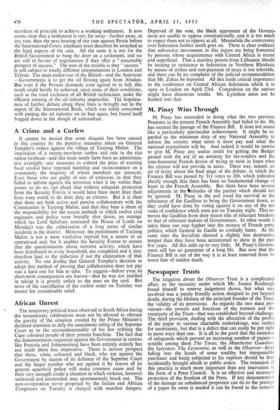A Crime and a Curfew
It cannot be denied that some disquiet has been caused in this country by the punitive measures taken on General Templer's orders against the village of Tanjong Maim. The imposition of a twenty-two-hour curfew and cuts in the rice ration (without—and this must surely have been an administra- tive oversight—any measures to control the price of existing food stocks) have imposed hardship and inconvenience on a community the majority of whose members are innocent. Even those who are guilty of sins of omission, in that they failed to inform against the terrorists when it lay within their power to do so, can plead that without adequate protection from the Security Forces it would have been more than their lives were worth to do their duty as citizens. But it is clear that there are both active and passive collaborators with the Communists in Tanjong Malim, and that they bear a share of the responsibility for the recent ambush in which twelve civil engineers and police were brutally shot down, an ontrage which (as Lord Salisbury reminded the House of Lords on Monday) was the culmination of a long series of similar incidents in the district. Moreover, the punishment of Tanjong Malim is not a mere vindictive reprisal but a means to an operational end; for it enables the Security Forces to ensure that the questionnaires about terrorist activity, which have been distributed to every household, are completed and it may therefore lead to the reduction if not the elimination of that activity. No one doubts that General Templer's decision to adopt this method of proving that collaboration does not pay was a hard one for him to take. To suggest—before even its short-term consequences are known—that he was not justified in taking it is grossly unfair to the man on the spot. But news of the cancellation of the curfew order on Tuesday was matter for considerable relief.


































 Previous page
Previous page